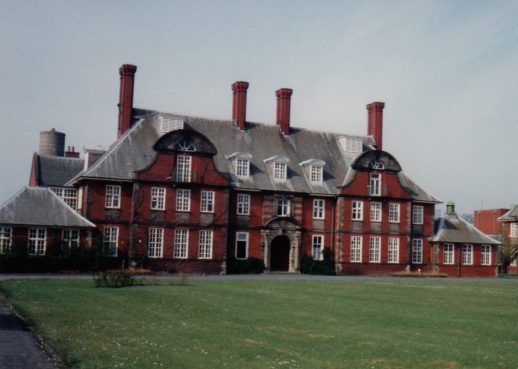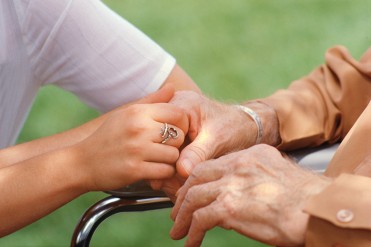
Photo from http://www.lancslearningdisabilityinstitutions.org.uk
In 1985 I went on a college visit to a ‘mental institution’ called Brockhalls Hospital in the beautiful Ribble Valley, near Whalley. It was part of my Preliminary Certificate in Social Care course and we were doing a topic on learning disability.
It was the first time I had ever met any adults with Profound and Multiple Learning Disabilities (PMLD) or adults with physical conditions like Cerebral Palsy. There were about a dozen or more adults, propped up in chairs or wheelchairs, arranged in a semi circle around a large day room. It was sparse and clinical, like a you’d expect a hospital to be. What they thought as a dozen young students piled in to look at them I don’t know. I know most of us were caring types and so we plucked up the courage to sit beside one of the residents and try to communicate with them. I sat by a lady, who to me looked elderly and who was rocking gently, staring into the distance. I said hello, my name and stroked her hand for a few minutes. Then we got up and left.
I cried when I got home. Part of it was the shock. The shock of seeing people so disabled was one aspect, if I am to be honest. These people were not part of my everyday experience. It was also the shock of realising that people had been shut away in this institution, away from the rest of the world. It was then I began to ask what I could do about that.
This was the mid 80s and things were about to change. By 1992 the hospital had been closed and most of its residents moved to community homes. Some of them moved not far from where I was eventually going to live. And my town is still well serviced by group homes for adults with learning disabilities. “These people” are part of our community and a meeting people with learning disabilities during a trip to the supermarket, or in the town centre is daily life. It’s one reason why our Good News Group is so well attended. It is part of our community, for those who live in our community.
I’ve been reading about the old hospitals. There is a community exhibition that I’m going to see next week and a website to go with it. I remember my fear on the way to visit Brockholes in that college year. The 17 year old me was more worried about how I would be able to communicate with the residents, what I might do to offend them and whether I would look stupid in front of my classmates. Fears my classmates probably shared. But this visit had a profound effect on me. Not yet a Christian at that age, God was already preparing and teaching me for my future.
I learned that fear was born out of my ignorance. I didn’t know these people I was meeting, I didn’t know about their conditions. But I also learned that making that first step, of going to sit with that lady and to say hello, took away a lot of that fear. I’ve always, ever since, made a particular effort to speak and say hello to anyone with disabilities that I meet. A fulfilling life, an invitation, an offer of help, an opportunity to join in, a chance to share their talents and serve others – these are all things that people with learning disabilities are prevented from by our fear. The Church of England are currently debating the value and place of people with Down’s Syndrome in our society and Churches. What’s the biggest problem they face? – not things they can’t do – but other people’s fears. These fears are always wrapped up in political language…the scarcity of resources, quality of life and ‘their own good’. When what we really fear is the challenge to us in making a more inclusive society, sharing our resources more evenly and putting the systems in place to help those who need better accessibility.
I know people fear what they don’t know or understand. I know we fear embarrassment, or offending someone or not knowing what to say or do. We fear having to be challenged out of our comfortable ways that only make comfort for certain people, and make barriers for others.
Imagine being the one who no-one talks to, or no-one bothers to try to communicate with, the one other people think is worth less than others? We have to take God’s words to our hearts and “Do not fear”. Because our fear is causing too many people to be excluded, bullied, exploited, abused and ignored – and that IS in our churches as well as in society.
God took the initiative in communicating his love for us. If he’d not bothered, we would truly be lost. His son Jesus communicates the same message to everyone. So my plea is please ‘do not fear’ and make the effort to find out, welcome and include people with learning disabilities and other additional needs into your lives.

picture from http://www.google.co.uk stock
(Note: This post came out of a conversation I had some time ago with a friend who had spent his early life in one of these institutions and had moved out in the 80s when he was about the same age as me at the time. He had a lot to say about being ignored by society and I said I would try my best to communicate the things we had talked about.)


Comments on: "Fear of Disabilities" (6)
I too remember Brockhalls well and when it closed we were living just a couple of miles away in the Ribble Valley. It was awful that people with learning disabilities were “put away” at that time and that parents of babies who had been born with disabilities were told to leave their baby in the maternity hospital for transfer to the infant wards of hospitals like Brockhalls and Calderstones in Lancashire. Thankfully some good folk worked in those institutions and we can give even greater thanks that people with learning disabilities generally have better lives in the community today – but we must not forget that there are those who struggle to live in our society because of lack of support, being taken advantage of, being bullied etc.
LikeLiked by 1 person
Yes, some progress made but the work goes on to make our society truly inclusive.
LikeLike
I certainly agree that work goes on and needs to go on – but it is good that much change has been made – even though there is still more to do.
LikeLiked by 1 person
I entirely agree that the Lord prepares you for your walk of faith with those wonderful people of our societies who have additional needs.
In my instance, from the age of 5 ( 63 years ago!!) my walk had begun, collecting milk bottle tops in school in order to raise funds for those who where non sighted. At age 6 befriending a housebound lady with both physical and learning disabilities. I know that this was my training ground at such an early age, in preparation for 34 years working in a full time position actually getting paid to do the best job I could ever have dreamt of .
By supporting the very special people who full filled my life by the love, the joy and the smiles they gave me in abundance every day gave me total satisfaction in my faith and my job.
Thank you so much for your story and for highlighting the need for inclusion and reaching out in friendship in our societies, it is so important.
I have been retired now for 6 years but still have forever friends. Your friends story has encouraged me to share mine . Thank you and may the Lord bless you both in all you do.
LikeLiked by 1 person
Thank you for sharing your story Shirley.
It’s clear that you’ve had some important relationships that have shaped your faith and life. I always think we have a lot to learn and receive from people with learning g disabilities. Neither are they ‘angels’ but people with the full range of ups and downs and in need of Jesus’s saving grace like all of us do. It’s a joy to share faith with them.
LikeLike
Fantastic post. The memory of places like this is seen in the street names near our estate – ‘Hospital Lane’ was where the local institution used to be. I always look at the street sign with sadness, because a few decades ago, it’s that sort of institute that my eldest could’ve ended up in.
LikeLike